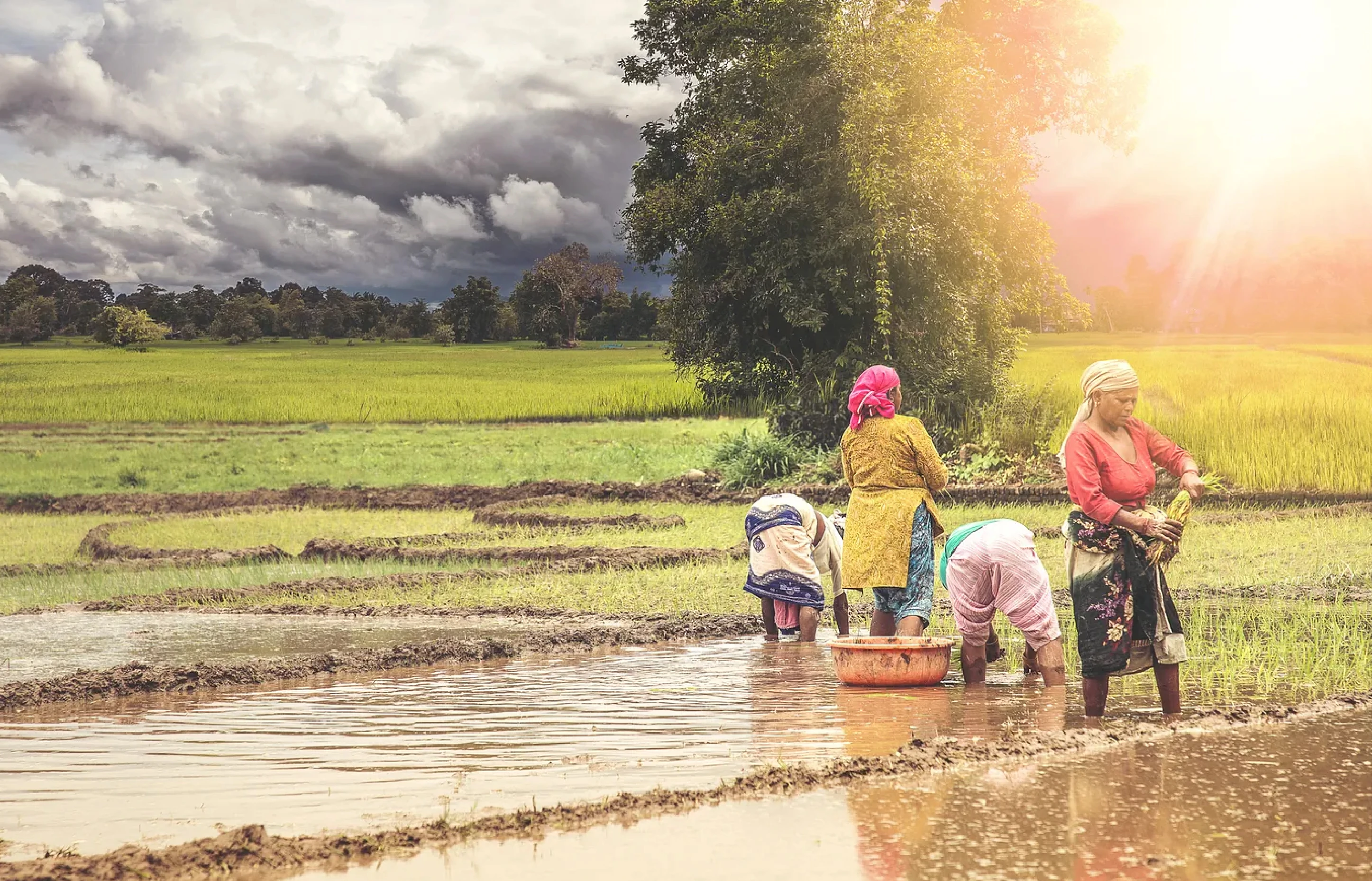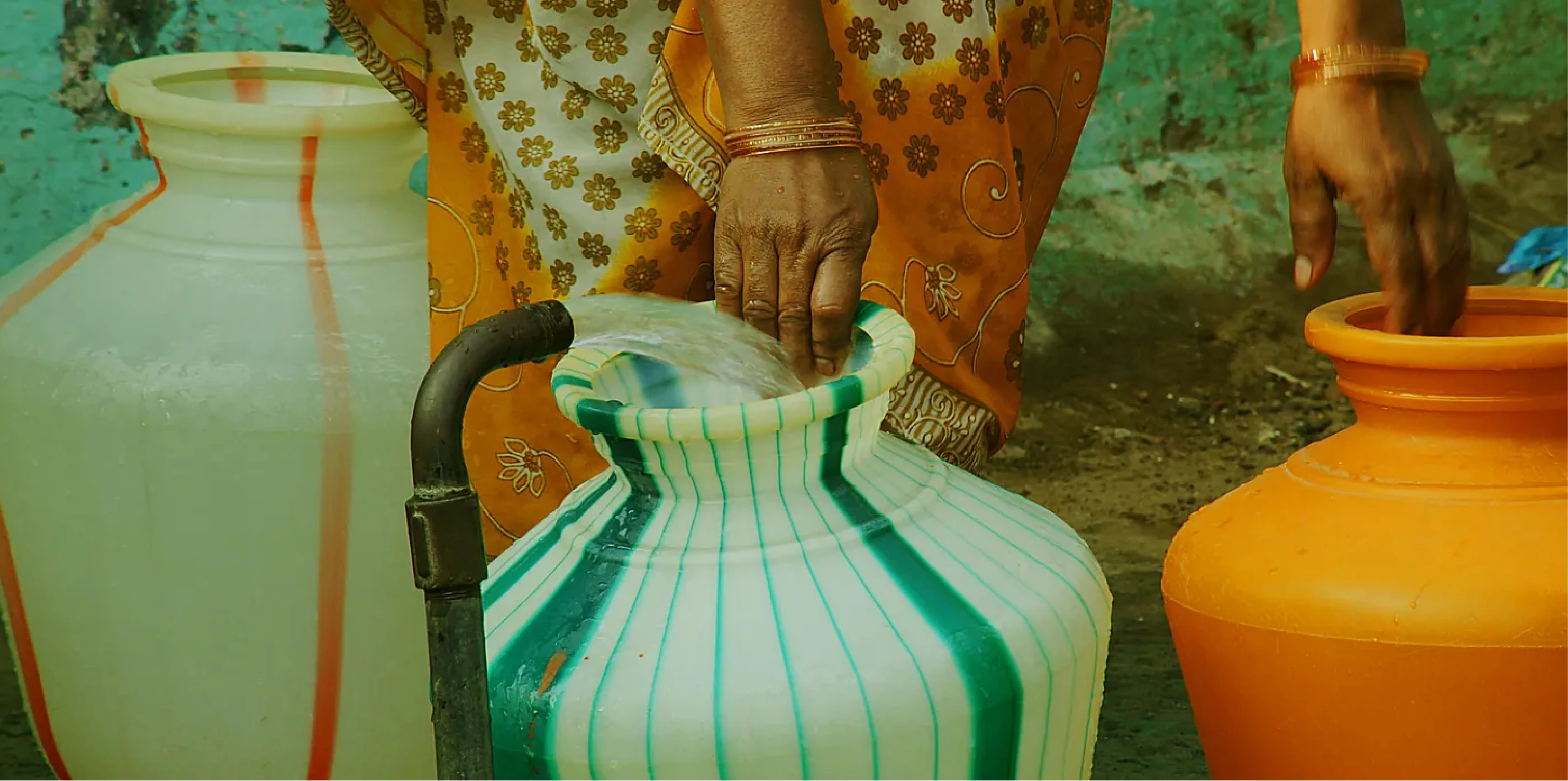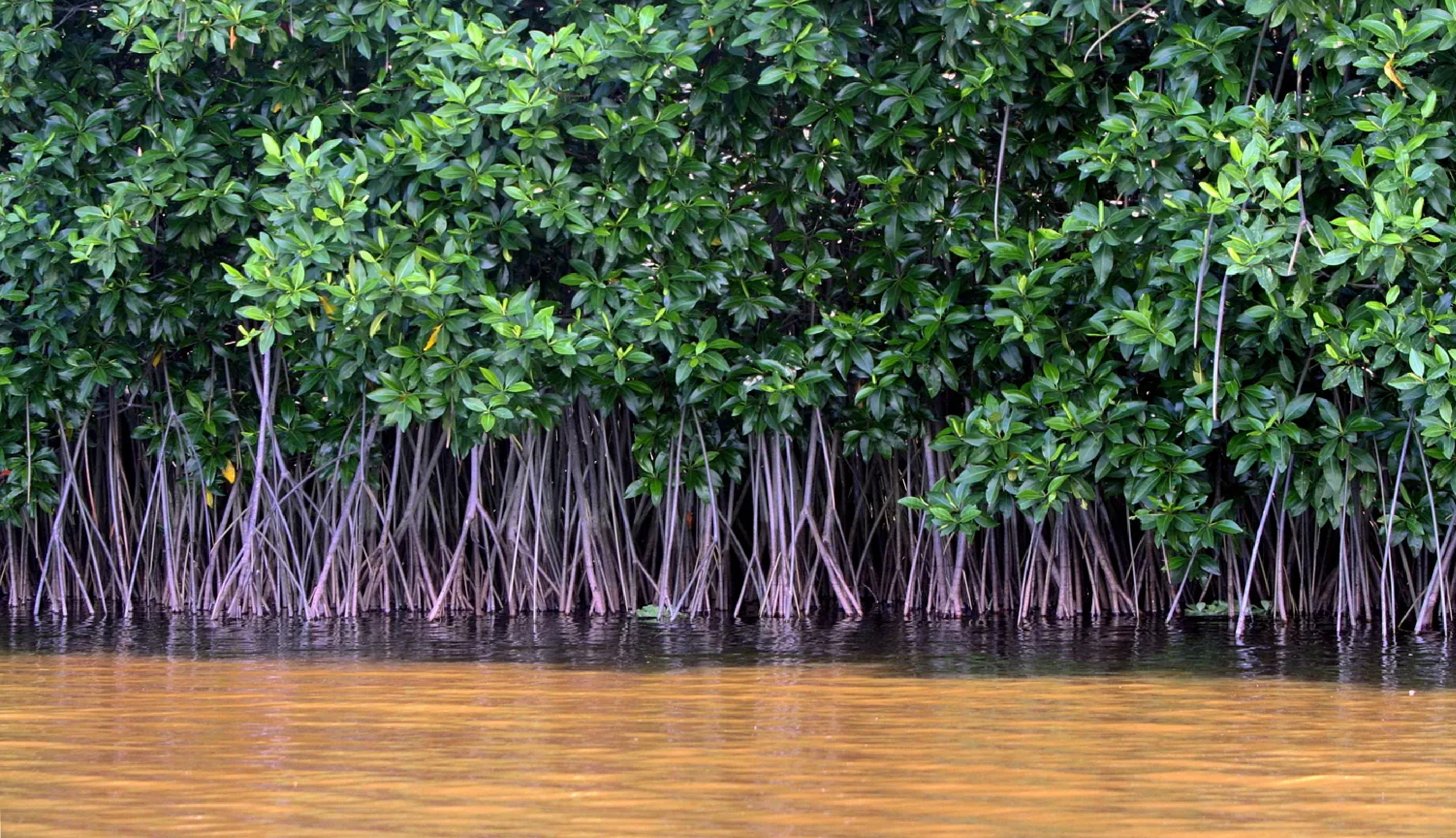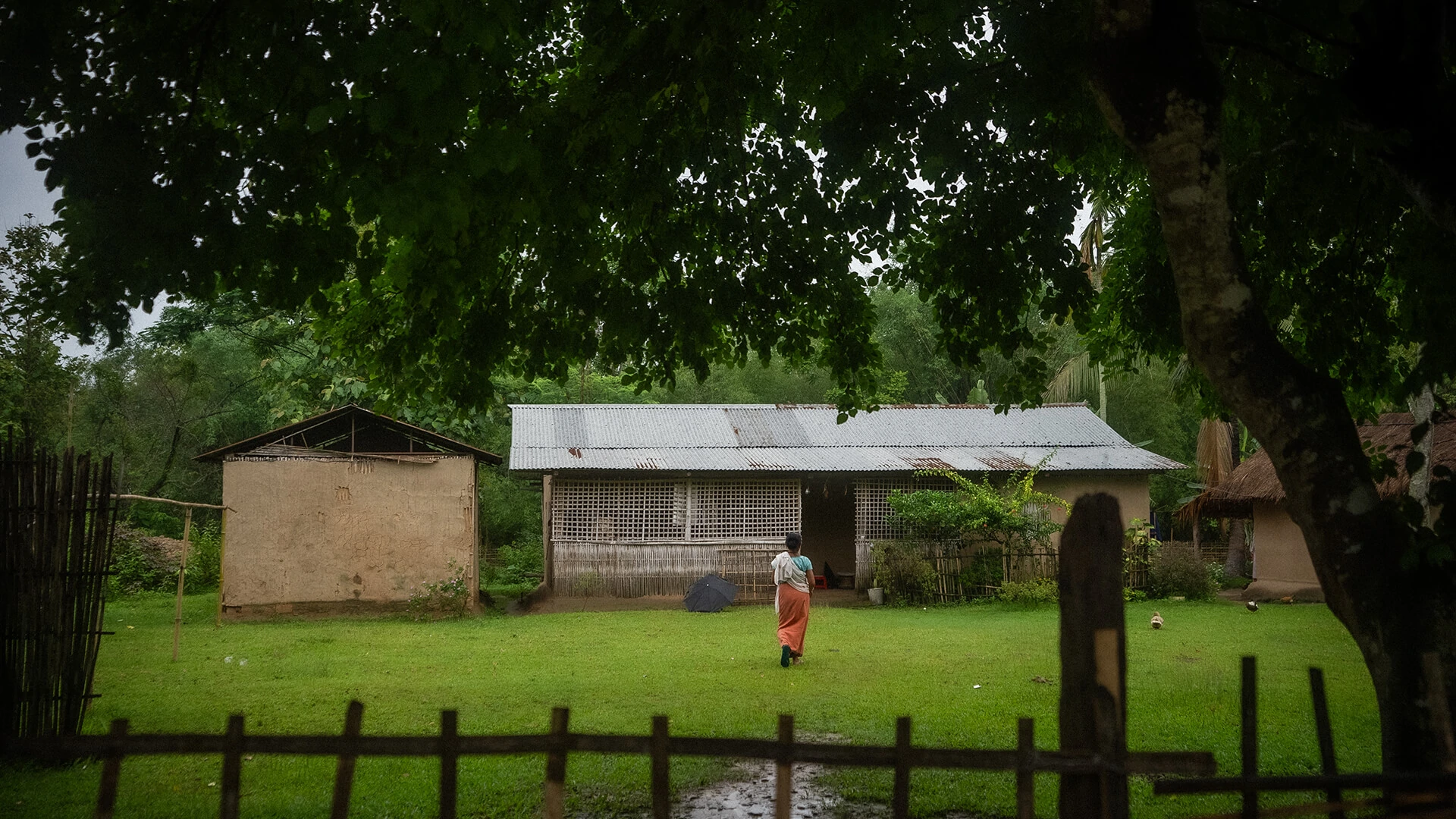Updates from our ongoing collaborative efforts to create scalable climate solutions in different sectors
Our program team works alongside our network of partners, such as NGOs, thinktanks, donors, and government authorities, to fill gaps in the climate ecosystem, and create scalable solutions in different sectors. Our focus areas include: reducing climate risks and building resilience by restoring degraded lands, scaling natural farming, improving water management, mainstreaming nature-based solutions, and decentralising climate risk decision-making.
We are also working with our partners towards decarbonising industry through our SteelZero initiative; facilitating just transitions by supporting socio-economic planning in mining regions in Jharkhand, and monitoring air quality, and training local communities to engage in decision-making processes towards clean air.
We have summarised our progress for 2022 below.
Reducing climate risks and building resilience
AREST | Building and executing a roadmap to restore India’s degraded lands
The Alliance for Reversing Ecosystem Service Threats (AREST) consortium, supported by the ICC, aims to help meet India’s 2030 goal of creating an additional carbon sink of 2.5–3 billion tonnes of CO2 equivalent from forest and tree cover. Further, AREST aims to restore 12 million hectares of land in 13 states, 204 districts, and for 90 million households in semi-arid and sub-humid zones of peninsular India, across three critical ecosystems — riparian habitats, degraded agricultural lands, and open and natural habitats.
In the first phase, the consortium quantified the extent of degradation of the most critical ecosystems, and highlighted seven steps for landscape restoration.
The AREST consortium comprises of Foundation for Ecological Security (FES), World Agroforestry/International Center for Agroforestry (ICRAF), Environmental Defense Fund (EDF), Columbia University, and Ashoka Trust for Research in Ecology and the Environment (ATREE).
Bio-input Resource Centers | Towards scaling natural farming and transforming food systems.
The ICC has partnered with the National Coalition for Natural Farming (NCNF) to identify critical ecosystem gaps that impede scaling natural farming at the farmer-level. These include gaps in bio-input availability, knowledge of local inputs, preparation methods, availability of raw materials, and application techniques that impede its scaling-up at the farmer-level. Natural farming allows freedom from external purchased inputs, cost reduction, and improves soil health and ecosystems while increasing farmers’ incomes.
The ICC also engaged in capacity-building of farmers and entrepreneurs through Bio-Input Resource Centres (BRCs), by supporting WASSAN, the secretariat of NCNF. BRCs are for-profit small-scale enterprises that act as a one-stop-shop to speed up farm agroecological practices, and transform paradigms of food systems. This effort has set up 182 BRCs, of which 15 BRCs have almost standardised their processes and systems. In addition to the release of a Natural Farming Technical Process Manual, which is a repository of methods to prepare bio-inputs, this effort has also facilitated 8 training sessions across 5 states and built the capacities of 272 individuals. A women-centric training program is also planned in Gujarat to encourage women to become BRC entrepreneurs, along with trainings in Jharkhand and Himachal Pradesh.
Decarbonising industry
SteelZero | Creating pathways to low emission steel
SteelZero is a global initiative that brings together leading businesses across the steel industry to make a public commitment to buy and use 50% low emission steel by 2030, setting a clear pathway to using 100% net zero steel by 2050. To note, India is currently the second largest producer of steel after China, with emissions from India’s steel industry projected to triple over the next three decades. With the understanding that India’s net-zero journey will rely heavily on the decarbonisation of its steel sector, the Climate Group, in partnership with ResponsibleSteel, launched SteelZero in July 2022, which was seed funded by the ICC.

Jaltol | Improving rural water management and budgeting for climate resilience
Jaltol is a free, open-source water accounting tool that makes water balance estimation easy in grassroots communities. With the Jaltol plugin, decision makers in the rural water security planning process can get data on their watershed, and estimate their water budget, hopefully resulting in better water management. The ICC is supporting CSEI-ATREE (Centre for Social and Environmental Innovation — Ashoka Trust for Research in Ecology and the Environment) in developing and scaling Jaltol, to address gaps in data and capacity at the grassroots level, and help CSOs and Government institutions that plan and implement rural water security programs. While CSEI-ATREE is currently focusing on CSO partners, eventually, the plan is to integrate the tool with national level water security programs.
The first version of Jaltol was socialised with over 30 organisations, including government officials, academic institutions, CSOs, start-ups, and philanthropic organisations; inputs from this process informed additional data layers for the tool’s simplicity and immediate adoption. For the second version of the tool, CSEI-ATREE is currently working with and field testing the tool with two key partners — FES and WASSAN — to develop the tool to meet their immediate planning needs and to identify additional use cases for the tool. The tool will be ready for launch in 2023.
Nature-based Solutions | Mitigating climate risks and building resilience.
Recognising the potential of Nature-based Solutions (Nbs) to address adaptation, mitigation, environmental management, and disaster risk reduction (UNDRR, 2021), the ICC, in collaboration with KPMG for the UN Decade for Ecosystem Restoration, published knowledge products and a first-of-its-kind report on the state of land-based NbS funding in India. We then translated our findings for a wider audience, in our podcast Second Nature.
In order to make a case for increased investments in NbS, CEEW is mapping NbS interventions across all states in India, with the ICC’s support. This program will highlight hazard-specific NbS interventions that can build community resilience, with a focus on floods, cyclones, and droughts. We will also conduct a pilot cost-benefit analysis of hazard-specific NbS interventions, demonstrating cost-effectiveness along with mitigation-adaptation co-benefits — to build quantitative evidence for averted loss and damage.

Climate Risk Atlas | Decentralising climate risk decision-making.
The ICC is supporting CEEW to build India’s first composite Climate Risk Atlas (CRA), to decentralise climate risk decision-making, and support evidence-based decision making by government authorities and other stakeholders. Building on the 2021 report that mapped India’s climate vulnerabilities at the district level, CEEW is now creating a Climate Vulnerability Index (CVI) at the sub-district level. For this, CEEW is designing the socialisation of scientific data through customised capacity-building exercises at the state and district level. CEEW is also presently providing sector-specific adaptation and mitigation strategies for Maharashtra and Rajasthan, to build resilience to increasing impacts of climate change in highly vulnerable sectors, like agriculture and water.
Additionally, the program will map climate vulnerabilities of critical infrastructure in sectors such as transport, power and health, to make a case for increased investment in climate-proofing critical infrastructures. This will be followed by a pilot city/district-level climate-proof infrastructure action plan.

Facilitating just transitions
District Mineral Fund evaluation in Jharkhand | Improving socio-economic planning in mining regions
The ICC supported the International Forum for Environment, Sustainability and Technology’s (iForest) work with district-level authorities in Jharkhand to improve socio-economic outcomes for mining communities. iForest evaluated the status of implementation of local financial resources (District Mineral Foundation funds, in particular) in Jharkhand, with a focus on the top mining districts, and highlighted reform recommendations in a report. iForest also supported state-level capacity building needs via workshops anchored by the mines department, involving over 60 district authorities from agriculture and mining departments.

Monitoring and improving air quality
India Clean Air Connect Platform | Supporting ecosystem collaborations towards clean air
Recognising that the air quality (AQ) ecosystem in India has great potential to further policy and action for clean air, the ICC, in collaboration with Sensing Local, mapped and analysed 350+ AQ stakeholders in India in 2021 to understand the status quo of the ecosystem, having detailed our findings in a comprehensive summary report. Data from the study suggests that systems-level action is missing in the ecosystem; most actors work in silos and interact with each other at a limited scale, leading to fragmented action as well as scope for redundancy. To address the same, we are currently developing an open-access database, India Clean Air Connect, which will provide stakeholders with the ability to collaborate across the ecosystem, align on goals, and coordinate action across diverse sectors and geographies.
Keep an eye out for the India Clean Air Connect database, and the summary report, to be launched in early 2023.
Wataavaran Mitr Fellowship Program | Building local capacity for monitoring and action
To encourage local governments to expand monitoring networks and facilitate regional air quality action, the ICC collaborated with Waatavaran to facilitate the installation of 4 low-cost air quality sensors each in 5 key non-attainment cities in Maharashtra, including Ulhasnagar, Chandrapur, Aurangabad, Latur, and Solapur; data from the sensor networks is consistently uploaded and updated on an open-access dashboard for citizens and other stakeholders to use for their own safety, as well as to advocate for cleaner air.
Furthermore, the initiative also focused on building capacity within communities to not only map the AQ landscape in their cities, but also track the implementation of city clean air plans, by training local communities of change-makers to AQ sensors and analyse AQ data, build local awareness regarding air pollution, and engage in decision-making processes with government stakeholders. By way of the above, the Waatavaran Mitr Fellowship Programme aims to build a replicable model for AQ monitoring and advocacy for clean air, for non-attainment cities in India.
Learn more about the initiative on YouTube.

Subscribe to our Newsletter
Join ICC's monthly newsletter and read more about uplifting climate narratives, innovative solutions, and other updates.




